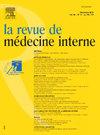Prise en charge d’une neutropénie fébrile post-chimiothérapie
IF 0.9
4区 医学
Q3 MEDICINE, GENERAL & INTERNAL
引用次数: 0
Abstract
Febrile neutropenia is a medical emergency requiring rapid and rigorous management considering the risk of severe infection. Febrile neutropenia is a frequent complication in patients receiving chemotherapy. Initial assessment is vital in order to decide the follow-up (outpatient treatment, conventional care or intensive care unit) and to initiate adapted antibiotic therapy as soon as possible. Depending on the infectious syndrome (clinically documented, microbiologically documented or undocumented), antibiotic therapy should be adapted or discontinued, considering the recovery from aplasia and absence of fever. Antifungal agents are not systematically used and its use should be discussed according to the context. G-CSF should be used prophylactically, and is not an adjunct to antibiotic therapy for febrile neutropenia. Granulocyte transfusions are exceptionnally indicated and its use should be discussed on a case-by-case basis. Standard precautions are adequate for the majority of patients, with the exception of specific situations.
[发热性中性粒细胞减少症的处理]。
考虑到严重感染的风险,发热性中性粒细胞减少症是一种需要快速和严格管理的医疗紧急情况。发热性中性粒细胞减少症是化疗患者常见的并发症。初步评估对于决定后续治疗(门诊治疗、常规护理或重症监护病房)和尽快开始适应的抗生素治疗至关重要。根据感染综合征(临床记录、微生物记录或未记录),考虑到发育不全的恢复和没有发烧,应调整或停止抗生素治疗。抗真菌药物没有系统地使用,其使用应根据情况进行讨论。G-CSF应预防性使用,不能作为发热性中性粒细胞减少症抗生素治疗的辅助用药。粒细胞输注是特殊的适应症,它的使用应根据具体情况进行讨论。除特殊情况外,标准预防措施对大多数患者是足够的。
本文章由计算机程序翻译,如有差异,请以英文原文为准。
求助全文
约1分钟内获得全文
求助全文
来源期刊

Revue De Medecine Interne
医学-医学:内科
CiteScore
0.70
自引率
11.10%
发文量
526
审稿时长
37 days
期刊介绍:
Official journal of the SNFMI, La revue de medecine interne is indexed in the most prestigious databases. It is the most efficient French language journal available for internal medicine specialists who want to expand their knowledge and skills beyond their own discipline. It is also the main French language international medium for French research works. The journal publishes each month editorials, original articles, review articles, short communications, etc. These articles address the fundamental and innumerable facets of internal medicine, spanning all medical specialties. Manuscripts may be submitted in French or in English.
La revue de medecine interne also includes additional issues publishing the proceedings of the two annual French meetings of internal medicine (June and December), as well as thematic issues.
 求助内容:
求助内容: 应助结果提醒方式:
应助结果提醒方式:


